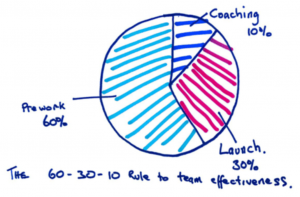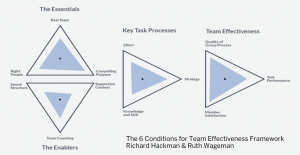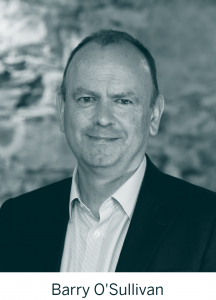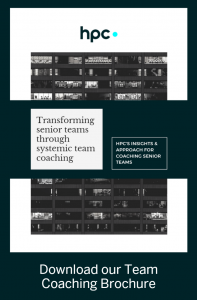Part Two: Who is responsible for the shift to hybrid working?
As organisations share their ‘return to office’ plans with employees, HPC’s Head of Research, Justin Kinnear asks “Who is responsible for making this hybrid arrangement work?”
In our last article on the Future of Work post Covid-19 – Part One, we explored how many organisations were anticipating the future and beginning the shift to some form of hybrid working. A true hybrid work model will combine staff working from home and staff working from an office and the number of days committed to both may vary depending on individual roles and responsibilities.
With summer 2021 upon us, many organisations are now signalling their hybrid working plans to their employees. Anecdotally, most organisations expect to start welcoming staff back into office environments from September 2021. Of course, many employees have already returned, while some never left their posts at all during the pandemic. As organisations share their RTO (return to office) plans with employees, the question remains: “Who is responsible for making this hybrid arrangement work?”
Not everyone is shifting to hybrid working
It’s tempting to think that hybrid working appeals to everyone who formerly commuted to an office job, but that’s not the case. Some employees, and perhaps more telling, some employers, have made it clear they intend to ‘go back to how things were’ as quickly as possible. Recent press coverage of some prominent professional and financial services firms suggests that they don’t see hybrid working as a viable approach for their staff. Time will tell, as it appears that among employers globally, they are in the minority view. We may also see that staff, particularly those with in-demand skillsets are able to determine their working arrangements regardless of the views of the firm.
The emerging shape of a hybrid working arrangement
What seems clear now is that most people will aim for a work arrangement where 2 to 3 days can be worked remotely, and the remainder worked at the company office. Based on our recent work with clients, our experience is that more than 75% of staff express a preference for this arrangement. While some may elect to work more or less days at the office, the biggest determinant is likely to be the requirements of the team you work in and if you are a people leader, the team that you lead. We expect some meetings and learning activity to continue virtually, while other meetings and collaborative activity will resume in the face-to-face format either in the office or at other physical venues.
What’s not clear yet is the amount of overlapped attendance, that is, whether we expect that on certain days everyone in a team will be simultaneously present in the office. Deliberations continue about this, and it makes sense for organisations to be flexible for the first few months to figure out what works best. Many organisations are experimenting with the use of personas to determine what a hybrid working model may look like for different staff across the organisation. What is becoming clear is that a model will take some time to emerge. Deciding up-front on an attendance policy and rigidly imposing it from day one is surely a recipe for failure and acrimony. Experiment in partnership with your team, take an agile approach and let the best solution emerge from experience.
So, who is responsible?
If hybrid working is to be successful, then who is responsible for ensuring this? Our view is that it will take the collective will of the organisation and like any cultural change, will require the efforts and purposeful intent of leaders, the HR team, the individual, and line managers.
Senior Leaders
The degree of genuine commitment to hybrid working will be signalled through the words and actions of the organisation’s most senior leaders. It won’t matter what the policy or emails about hybrid working say if the leaders are saying and doing something different. Senior leaders must lead from the top and lead from the start. Based on our experience, one of the biggest issues that senior leaders will face is the need to consciously include those working at a different location in decision making and ensure that their contributions and impact are not diminished by virtue of where they work.
The HR Community
HR and the management community should be aligned about hybrid working. HR must help managers to establish new working arrangements, encouraging flexibility while at the same time making sure the business can meet its objectives. Lynda Gratton, Professor of Management Practice at London Business School, suggests in her research ‘How to Do Hybrid Right’ that HR needs to help managers and staff consider their roles based on the dimensions of:
(1) jobs and tasks
(2) employee preferences
(3) projects and workflows
(4) inclusion and fairness
HR should work with managers to help them understand and map the impact of each of these dimensions on the work of their team and what it might mean for hybrid working.
Equally, there is an opportunity for HR to work in a very agile way over the coming 6-9 months. Based on our conversations with clients, there is an expectation that the model of hybrid working that emerges in mid 2022 will be very different from that in Autumn 2021. HR have an opportunity to experiment and iterate with managers over the next year to develop ways of working that support the organisation and the people within it.
HR will also need to watch out for pockets of resistance in parts of the business to hybrid working. Turning a blind eye to company policy and allowing managers to create micro-regimes where they don’t support hybrid working is to be avoided. If an organisation commits publicly to hybrid working, then the HR community owes it to the entire business to play their part in supporting and enabling hybrid working throughout the organisation.
The Individual Employee
Trust has been a huge part of why the shift to mass remote working was so successful during the pandemic. Managers needed to trust employees because they had no choice. Employees needed to deliver on their commitments in exchange for that managerial trust but also in exchange for autonomy over the working day and how they used their time to get work done. As we move to the new hybrid working arrangements, it will be a little strange for managers to take comfort from being able to see people at work, while also needing to trust when they can’t see them while working at home. This will require great adaptability from managers and will also require employees to, once again, prove their dependability and trustworthiness by getting the important things done as promised. Flexibility, better wellbeing, increased family time, less time spent commuting and all the other benefits of remote working remain available if employees continue to deliver their side of the bargain. Essentially, employees have a big say in the ongoing success of hybrid working by showing that productivity, responsiveness, and participation are as strong from home as they are from the office.
Line Managers
Thinking about the question we began with, “Who is responsible for making this hybrid arrangement work?”, the most critical person of all is the line manager. How will we know if hybrid working is indeed working? We will only know if the line manager knows, and that requires the line manager to be on top of everything. The good news is that this should not require much more than what the line manager has been doing since the pandemic began.
First, line managers must continue to trust their team members and now build up that trust when they have the chance to meet each person in the office. Avoiding the signal “I trust you more when I can see you” is a good start. Trust is about promises honoured and work completed, not how anxious I feel when you are out of my eye-line.
Second, line managers need to plan for the hybrid work environment. They should know who is in the office on which days, and who is working remotely. They should keep track of with whom they have discussed performance, to whom they have provided recognition or feedback and so on. This reduces the possibility of proximity bias where those near the manager get higher quality interaction, while those far away feel forgotten about.
Third, line managers will do well to focus on the execution of work. Are people completing the actions they committed to complete? Are promises being honoured as expected? Managers who drive performance and execution the same way, whether people are in the office or at home, will create a culture of performance and accountability. It should not matter where work is done, but if managers only know about work they can see in the office, this creates a problem. Encouraging everyone to do what they say they are going to do, including the manager, creates reliability and trust irrespective of where people are doing the work. Checking in regularly on actions and progress keeps everyone focused on execution and promises.
Line managers will also need to attend to the well-being of the team. Teams have been through a great deal of upheaval, and many are exhausted by the pandemic experience. As we move into the hybrid working stage, managers will need to work with their team to rebuild trust. Remember that some people have joined teams during the pandemic and have never met colleagues in person. Others have left or retired, so teams will need to “relaunch”, as Harvard’s Tsedal Neeley puts it. Team members need to know that they can count on one another as they tip toe into this new stage of working together. Time invested in rebuilding relationships, re-energising and relaunching the team, will be time well spent indeed.
Finally, when line managers don’t report productivity or performance upwards, they inadvertently create doubt and misgivings that hybrid working does not deliver. Once again, we only know things are working when we can see the data that shows us so. Keep track of the data that will help those around and above you to see that hybrid working is delivering for the business and for the team. Sticking a finger in the air and taking a feeling about how things are going is not sufficient. Gather the data on performance and productivity. Is work progressing? Are the team succeeding? Do we have challenges and issues, and can we forge a plan to address them? Data helps. Strong data convinces. Make data your friend and most importantly share it with those who need to know what it says.
We all have a part to play
We all have a part to play in making hybrid working a success. It represents another adjustment, another demand to adapt and learn, and it presents us with a chance to strengthen relationships and trust. To lock in the gains of more than a year of remote working and blend them with the benefits of office life, we should take our time to identify the best ways to work as a team from here. We don’t need all the answers up-front, but we do need to be willing to experiment at first. Leaders have a vital role in showing the way. Managers have a vital role too, encouraging good performance habits and tracking how the team is performing so we can say, unequivocally, that hybrid working is working well for the business.

Justin Kinnear is Head of Research at HPC. His passion for people development and his ability to inspire makes him a key member of HPC’s facilitation and coaching teams.
As well as his extensive research and facilitation experience, he was formerly Head of L&D at IBM and Britvic.
His work with HPC focuses on the development of a high performance culture for our clients with a particular emphasis on accountability and feedback.








